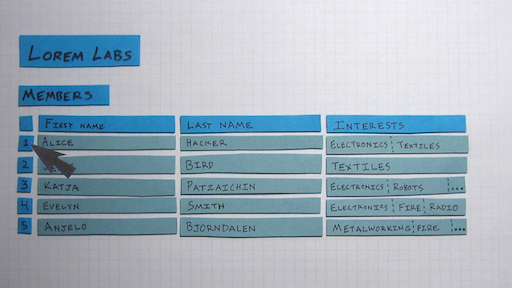Art, Code, and Asking

As a programmer, I know that code can be beautiful. As an artist, I know that code is not art. I don’t mean to say that code is in any way less, just different. And the difference is important, particularly when it comes to asking for support.
It’s a very exciting time for artists, as many turn to crowdfunding to support themselves. Either through single-shot funding campaigns, or ongoing patronage, artists are asking their fans for direct financial support, and fans are happy to give. The Boston-based musician Amanda Palmer has led the way, raising over a million dollars on Kickstarter to produce her most recent album. She reflects on the campaign in her book, The Art of Asking. In a passage that hit particularly close to home for me, she recounts a conversation with her mother, a programmer. As a teenager, Amanda had accused her mother of not being a “real artist” and years later, her mother told her:
You know, Amanda, it always bothered me. You can’t see my art, but… I’m one of the best artists I know. It’s just… nobody could ever see the beautiful things I made. Because you couldn’t hang them in a gallery.
Amanda came to recognize the unappreciated beauty of her mother’s work, and I have no doubt it was beautiful. But art is not just about beauty.
A few years ago, I was sitting in a client’s office in San Francisco, at a tiny desk overlooking the Highway 101 onramp, listening to music and writing code. The music was beautiful, but more than that, it showed me an entirely new perspective, that somehow felt deeply familiar. And in that moment, I felt a little more connected to humanity, and a little less alone. But I was sad to realize that my work would never help anyone else feel that way. I remembered a quote from Maya Angelou:
I've learned that people will forget what you said, people will forget what you did, but people will never forget how you made them feel.
Art catches and holds people’s attention by helping them feel new things. My work as a programmer, on the other hand, was forgettable. In fact, there’s a thing in software called the principle of least surprise: the better your code is, the less people even notice it exists. For a while, the thought of being unnoticed and forgettable left me with a sense of loss.
Relief came when I realized that although my code might never touch someone directly, it can (and has) helped artists who do. Just as the artist inspires the cancer researcher, the programmer empowers the artist. While the thought put an end to my mini existential crisis, some consequences remain, and that brings us back to asking for support.
Fans like Amanda Palmer’s give because they want to. They’re grateful for the gift of art, and they want to reciprocate. Emotion is a great motivator. But what about code? Software is complex, and beautiful, and important, but it doesn’t inspire the same emotion or generosity, because you never see the beauty. You can describe the types of things software will make possible, but that can seem overly abstract. I would like to think that crowdfunding can work for software as well as art. In fact, I’m currently running a campaign for software to manage makerspaces and other cooperatives. But how can programmers create the same connection with their users that artists create with their fans?
